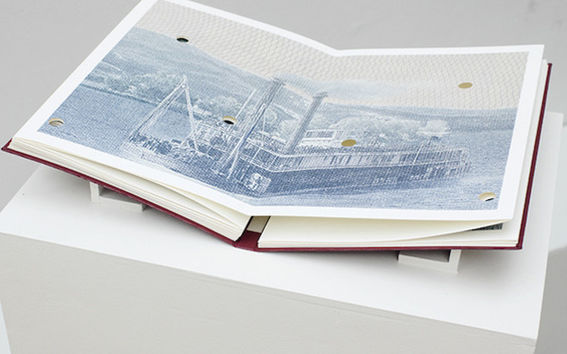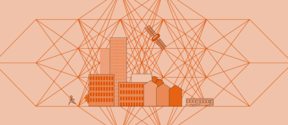Photography student Karl Ketamo’s work in the Photo X Photoville

Finnish born photographer Karl Ketamo’s (1987) “Landscape of Authority” is a series of landscape representations as depicted in passports. They construct narratives of national identity while displaying views on migration and movement of humans—a contradictory view given the specific nature of travel documents and their function.
Ketamo graduated in 2016 from the Royal Academy of Art, The Hague and is now studying photography in Aalto university. His graduation work was nominated for the prestigious Steenbergen Stipendium award and selected for the Young Artfund Amsterdam. Ketamo’s visual research and methodology often stem from a philosophical thought related to landscape in a cultural context.
Passport both allows and limits
Ketamo’s photo series consists of scanned images of passports of different countries. He wants to question the nature of the passport, i.e. how it limits mobility, which is based on agreements between countries and not on the individual's need to move. Passport is perceived as an objective definition of mobility, but it does not take into account the subjective need of people to move. He also ponders the significance and limitation of the passport: it is given to an individual according to the country in which one is born. It affects people's ability to move around the globe, although none of us can influence it.
“The most important thing for me is to get my work exposed in a country where the free movement of people by birth has been limited recently. At the same time, the free market is flourishing and the goods can move from a country to another fairly unlimited. This is completely absurd, "Ketamo says.
With his piece of work, Ketamo also wants to question the current idealization of national identity by the landscape. In his view, the national landscape has great importance in creating a national identity. He thinks the national landscape could even be considered a "threatened subject" when it comes to protecting our soil from external influences. In a way or another, however, Ketamo wishes to question the landscape as a creator of national ideology and borders. "We often feel that the landscape belongs within the boundaries of the country, but it is actually existing landscapes that we just have attached to our country by presenting images of them."
About boundaries, freedom and belonging
The four visual artists of the exhibition “(Un)Bound” are all based in Rotterdam, The Netherlands exploring the many written and unwritten rules defining boundaries and how they relate to our sense of freedom and belonging. The complementary, contradicting and sometimes even unusual visual strategies of the presented artists are linked by the exploration of the photographic landscape and migration, expressing the cultural interpretation and associations related to it.
Rotterdam Photo is a free-to-visit photo manifestation in the Netherlands that takes place every February during Art Week Rotterdam. Through an open call and an annual theme, it gives a wide range of independent photographers—from commercial to fine art, from amateur to the recently graduated—the chance to exhibit their work at the Kop van Zuid in Rotterdam, alongside the official Art Rotterdam fair. Rotterdam Photo is organised by Daguerre Foundation and More Productions, and takes place at the Katendrecht Deliplein (Deli Square), near the Dutch Fotomuseum. The photo festival presents photography in repurposed shipping containers and the public space of harbour city Rotterdam. During the Rotterdam Photo in February 2017 the festival grew from 8 to 32 containers and attracted around 5 000 photography lovers to visit. Alongside the exhibition also photo talks, Insta-walks and several workshops are offered to photo enthusiasts and professionals.
Read more: http://photoville.com/
- Published:
- Updated:
Read more news

DeployAI Partners Gather for Heart Beat Meeting in Helsinki
The European DeployAI project's partners gathered for the Heart Beat meeting hosted by Aalto University Executive Education in Helsinki.
Get to know us: Associate Professor Maria Sammalkorpi
Sammalkorpi received her doctorate from Helsinki University of Technology 2004. After her defence, she has worked as a researcher at the Universities of Princeton, Yale and Aalto.
A! Walk-Nature connection: Walk, pick, discuss
The afternoon adventure on Lehtisaari offered more than just a walk in the forest; it sparked conversations about renewed appreciation for the simple pleasures of life and the beauty of the Finnish wilderness...